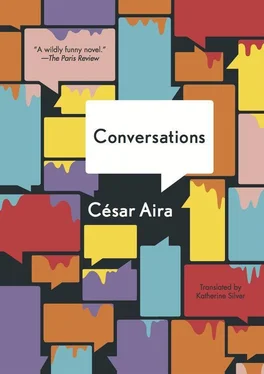The time lag in my memory persisted, so much so that while I continued to enjoy the somewhat surrealistic spectacle of the starry heavens and the luminous travelers from my bed, my friend was already asking me, in the conversation, what I was trying to prove.
Nothing! was the response I blurted out automatically. At this point, the lag was erased, and again I was in the step-by-step of our conversation and its nocturnal representation, with no images in front of me besides my friend’s face and the café in the background. Nothing! I was recounting it to prove to him that it didn’t prove anything. It couldn’t. What could it possibly prove? The end of the epic in a world that had sold the legacy of the word for the lentil soup of the image? And this was nothing new, everyone knew it, everybody agreed, the two of us included. I had only wanted to remind him, in case he had forgotten.
My friend, with a complacent smile, thanked me for reminding him, because in reality, more than remind him, I had filled him in on a lot of details he hadn’t known. I had filled in the panorama, he said in a teasing lilt, because he had to admit that he had paid only partial attention to the movie: he had had to answer two phone calls, one long and one short. Even so, something told him that the story had not really come to an end, that there were still a few loose ends. .
I also had to admit that my viewing had been partial. Not only because of the telephone, which I also had had to answer, but because I had watched all, or almost all, of the part I had just recounted without sound. I had pressed the “mute” button on the remote control because my wife, going in and out of the kitchen, had started talking to me. So, I had had to imagine the “sound,” or rather, the dialogues.
It was pretty amazing — about this we were in total agreement — that so much could happen in a two-hour movie. The word that explained it was “condensation,” but words also had to be explained. Moreover, in a movement that was inverse to that of condensation, there seemed to be a multitude of events because of the fragmentary nature of one’s perception.
My friend, surely taking into consideration what I had just told him about the button that muted the television — suggesting that I was constantly manipulating the remote control — asked me if by fragmentation I was referring to the curse of channel surfing. Without waiting for my answer, which he must have taken for granted, he asked me if I had noticed that the movie was shown on two channels at the same time. Though not precisely at the same time, he corrected himself, but rather, he figured, with more or less a half-hour time lag. He flipped back and forth between them a couple of times, without reaping any benefits other than seeing some scenes twice and entirely missing others.
No, I had not realized that, but now that he mentioned it I was less amazed by the coincidence that with sixty-four channels, we would have both independently tuned into the same one. We could have easily not tuned into the same channel but rather into two different ones, and still seen the same movie. Anyway, I didn’t know if this made it more or less of a coincidence.
And, though I didn’t say so, this fact explained something else: that both of us could have seen the entire movie in spite of the telephone interruptions. We had referred to these more than once in the course of our conversation, without saying, or perhaps without remembering, that the longest one had, in fact, been a phone call between the two of us, when we called each other to make the date to meet at the café the following afternoon, and we had prolonged it with remarks about our recent readings, as we always did, anticipating the conversation itself and touching on some topics we wanted to discuss. This shared distraction must have also created a shared blank, but the time lag (which, if it really was a half-hour long, coincided with the amount of time we spent on the phone) voided that blank.
But, to return to his previous question, which had been left unanswered: no, when I spoke of fragmentation I was not referring to channel surfing, or not exclusively to it. Experience itself, the experience of reality, already posited a model of fragmentation. Without needing to get philosophical, we could say that this happened in life the same way it happened in the movies. As real humans — imperfect and incomplete because real and human — we were always missing important things, essential links needed to understand the greater general story; afterward, full of doubts and errors, we pieced it together. It was memory that established the continuum; and since memory was also a reality of experience, it was also fragmented.
According to a well-conceived and well-executed constructivism, seeing half a painting should make it possible to know what the other half contained. And reading half a novel or poem, the same thing. Or half a symphony. Or half a movie, right? Though speaking of “halves” could lead one to think of bilateral symmetry, which is not what this was about. It could be any fragment, even a dinosaur’s worn-out vertebra.
But, haven’t we then fallen into the conventional and the predictable?
Yes, maybe so. But this was about a special kind of predictability, for it obeyed a convention created for that particular work, one that did not serve any other. At the end of the day, art was a convention, and if pushed, everything was a convention. Art was creation, and the first thing it created was its own convention.
My thoughts were fleeting, and I revisited them under less pressure while I was reconstructing this step in the conversation, in my conversations, to be more precise. Didn’t I re-
establish the continuum of what was naturally fragmentary and interrupted? Because a conversation, no matter how civilized and articulate it may be, is always made up of leaps and digressions, and steps backward, and, “I didn’t understand you,” and, “I understood you all too well.” The memory that organizes and completes them is a chance excrescence, which exists as it did for me: secretly, almost shamefully. Although it probably isn’t all chance, judging from the fact that memory is full of conversations.
Could a conversation be completed by deducing the recently born conventions after hearing only half of it? One would have to consider a conversation a work of art, which was not far from what I thought. But which half? Because it could be a temporal half, for example, the first hour, or the second, if it lasted two hours. Or the half that belongs to the responses of only one of the interlocutors. In this case it would be the kind of reconstruction — so common — that one performs when one hears someone talking on the telephone.
My friend responded to all of this with a sleepy expression on his face, his eyes half closed, staring off into space. He must have been carrying out a general review of our digressions, and the conclusion he reached is that we hadn’t made any progress. We continued in the same “tic” or the same “toc” of the Rolex.
No, that wasn’t quite it. I wanted to retract my former skepticism, because in reality I had proven something, almost without meaning to, or “without meaning to mean to”: I had proven, through the positive absurd, that fiction was fiction. To ride on a dehydrated goat through the star-studded sky, wasn’t that fiction? Who could ask for anything more? Through simple deduction, the actor who played the goatherd. . Wasn’t that crystal clear? In a certain way, we had reached the point where words die.
This reference to silence seemed to arouse my friend, exactly as when one has been hearing a constant noise for so long that one ceases to notice it, then when it stops, the contrast becomes deafening. He looked at me as if he didn’t recognize me, or on the contrary, as if he suddenly recognized somebody he had thought was a stranger. The expression on his face was so peculiar that when I tried to mentally reproduce it in my memory, I almost failed to find the representational resources to make it credible. What he said when he emerged from his state of perplexity was so amazing (to me) that I became electrified, and I moved into the present. My memory accompanied me into the present, like a written play that is being performed.
Читать дальше












